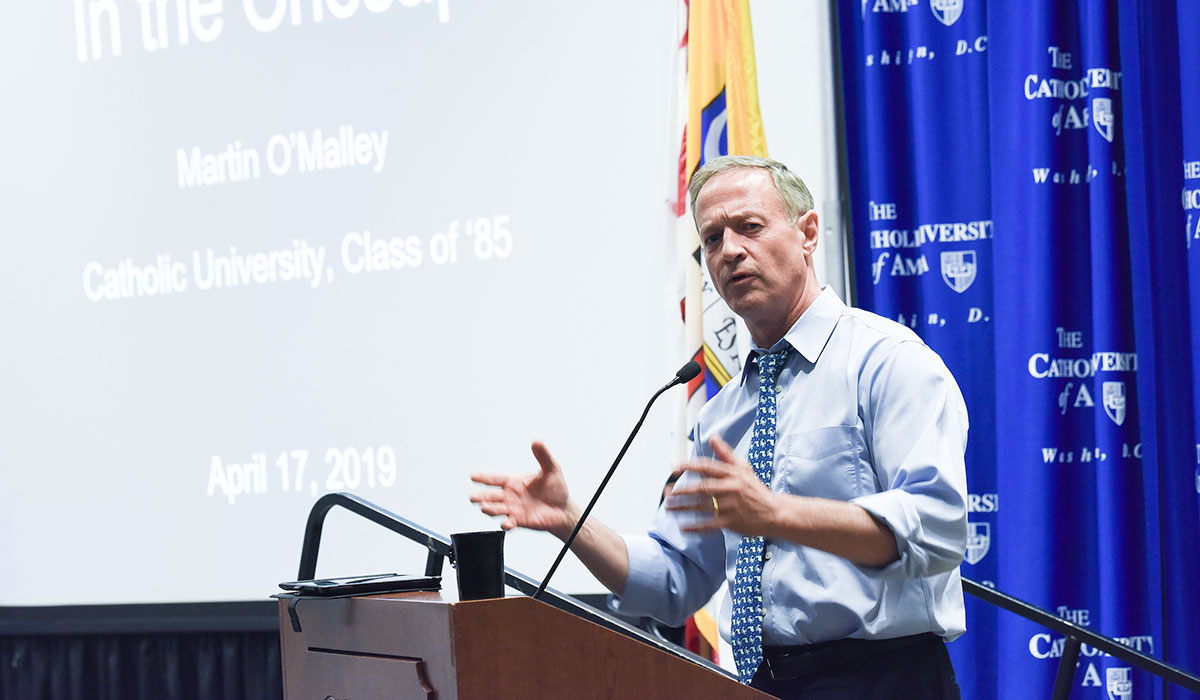

Martin O’Malley said he supports the so-called “Green New Deal” and wishes he had coined the phrase.
“Climate change is not a science issue. It’s a people issue.” That was the leading theme in the keynote address given by Rear Admiral David Titley, USN (retired), at the Challenges of Climate Change workshop held on Wednesday, April 17, in the Edward J. Pryzbyla University Center. Titley is the director of the Center for Solutions to Weather and Climate Risk at Pennsylvania State University.
Most people think of the llama as a South American member of the camel family; using “LLAMA” as a mnemonic device, Titley offered a model for individual response to the climate crisis. First, he advised, learn ways you can reduce your carbon footprint. Can you use wind power? Recycle? Go solar?
Second, take local action. “Don’t talk about polar bears. It’s about us,” Titley said. The next step is to be a monitor of changes in the natural world and of politicians. Ask politicians at every level what they will do to achieve climate stability, and monitor not just what they say, but what they do. Finally, advocate for what needs to be done.
Viewed clearly, Titley explained, climate change is also a national security concern. It is a contributing factor in the current refugee crisis engulfing much of the world. In addition, he said, climate change could cost American taxpayers billions of dollars to repair or prevent damage to U.S. military installations. He discussed the island of Diego Garcia in the Indian Ocean, a strategically crucial base of American military operations in Asia and the Near East, which could go underwater due to rising sea level.
This was the second conference on climate change sponsored by the Engineering Center for Care of Earth (ECCE). The center’s director, Ozlem Kilic, associate dean of the School of Engineering and professor of electrical engineering and computer science, plans to make it an annual event.
Continuing the practice established at the first climate change workshop, held in November 2017, Kilic invited a group of international experts to participate. Attendees included Giovanni Cecconi, founder of the Venice Resilience Lab, who spoke about Venice’s paradigmatic history of adapting to rising sea level; Rev. John Chryssavgis, archdeacon of the Ecumenical Patriarchate, who lamented the human failure to understand our common planet, which “unites us all, before and beyond religion,” as a sacred gift; Martin O’Malley, B.A. 1985, former Mayor of Baltimore and Governor of Maryland; and several other guests.
Cardinal Elio Sgreccia, a pioneering bioethicist, could not attend due to illness. His assistant, Emanuela Midolo, speaking in his stead, urged conferees to take greater responsibility for plants, animals, and the planet as “a legacy to every future generation.”
“A new way of governing seems to be emerging,” O’Malley said, related in part to the Information Age, in which political leaders, no longer assured of getting information ahead of everyone else, face increasing pressure to respond. “It’s about actions, not words.”
O’Malley noted that individual states, not the federal government, are driving energy policy in the United States. He finds cause for optimism in the fact that a majority of younger voters (in contrast to older voters) say they believe climate change is caused by human activity.
“The difference between a dream and a goal is a deadline,” O’Malley said, adding that we already possess the knowledge and skill to make many needed changes. “We have only need of will.”
“How we collectively respond in the next 10 to 15 years will show us whether we deserve the planet we live on,” said Edward Yim, an energy planner and lawyer who recently led the development of an energy plan for Washington, D.C., that would cut the District’s greenhouse gas emissions in half by 2032. “If we don’t mitigate successfully, the term ‘adaption’ will just become a polite euphemism for brute survival.”
Even in a best-case scenario, many participants agreed, there is trouble ahead. Kathleen McLaughlin, the chief sustainability officer for Walmart, said her company’s projections show that climate change will result in “supply security issues.”
Climate change is exceedingly complex. In addition to business, it affects domestic and international politics, food supply, and many other areas, such as social justice.
“Those most hurt by climate change in the future will be those who can least afford it,” Archdeacon Chryssavgis said. Addressing the problem effectively, he added, “will take nothing less than a crusade by religious and political leaders.”
Many speakers noted that of the many challenges posed by climate change, the greatest of all is changing our behavior.
Though he stressed the gravity of the problem, Titley noted, “I am not known for being an optimist, but I really do think change is coming. It’s being driven by voters.” Surveys show that a majority of Americans now say they have personally felt the effects of climate change.
“There is more than concern,” Titley said. “It’s starting to get to alarm and a demand for action.”